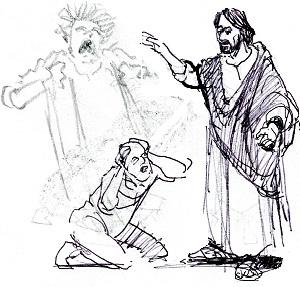
"Why could we not drive the spirit out?" (Mark 9:29).
Jesus' disciples are surprised that in his absence they cannot handle a father's request for an exorcism of his son. They invoke Jesus's name, but the possessing spirit will not yield. By the time Jesus returns, the entire scene has roiled into a stand-off fueled by crowd excitement.
Mark's account provides two detailed descriptions of the boy's convulsions and the father's plea that someone save his son before he destroys himself by alternatively throwing himself into fire and then water. When Jesus asks if he has faith, the father cries out with words we all recognize: “I do believe, help my unbelief!” Jesus then rebukes the spirit, eliciting a dramatic confrontation with the demon, whose departure leaves the writhing, convulsive boy as though dead, a corpse. Jesus takes him by the hand and raises him up.
Later, the disciples want to know what was lacking in their efforts. Jesus says that "this kind can only come out through prayer.” The words "this kind" suggest that for Jesus and his contemporaries there were some evil spirits of a higher and more powerful order, and that deeper spiritual power was required beyond the ordinary formulas for exorcism. We may view these forces through our own lens of medical and sociological categories, but the miracle of the boy's liberation is still stunning.
Prayer, of course, reminds us that only the Holy Spirit accomplishes any real spiritual change. The disciples are only channels of this movement, and so they must deepen their relationship with the Spirit to be instruments.
Most of us will not encounter such struggles, but all of us are invited to grow in our discernment and collaboration with the Holy Spirit, whose "possession" of us through baptism is why all lesser forces are displaced.
What we do encounter are the larger collective “spirits” that flourish in cultures and ideologies that drive social moods and ethos, often doing real harm and much seductive mischief and misdirection. For example, we see over-consumption driven by popular marketing and entertainment, or the frenzy that races across social media to produce mass responses. How many people fall susceptible to prejudice and caricatures, stirring fear and hateful actions that result from them?
To witness forces like nationalism and xenophobia at work to manipulate society is an awesome and troubling experience. Many are astonished to see the social fabric fraying and civility disappearing from our political and civil landscapes. Wartime brings out both the best and the worst in a nation. Racism and prejudice fester where fear is fed by propaganda. How does this happen, and what can be done to repair the damage inflicted on otherwise good and reasonable people?
Once we realize this is in fact a spiritual crisis, then we will know what Jesus meant when he told his disciples to deepen their spiritual resources and personal discipline to confront evil by devoting themselves to prayer. Only intimate personal friendship with the Holy Spirit will enable us to move into deeper realms where the real transformational work of God is taking place to liberate us and redirect the world.







